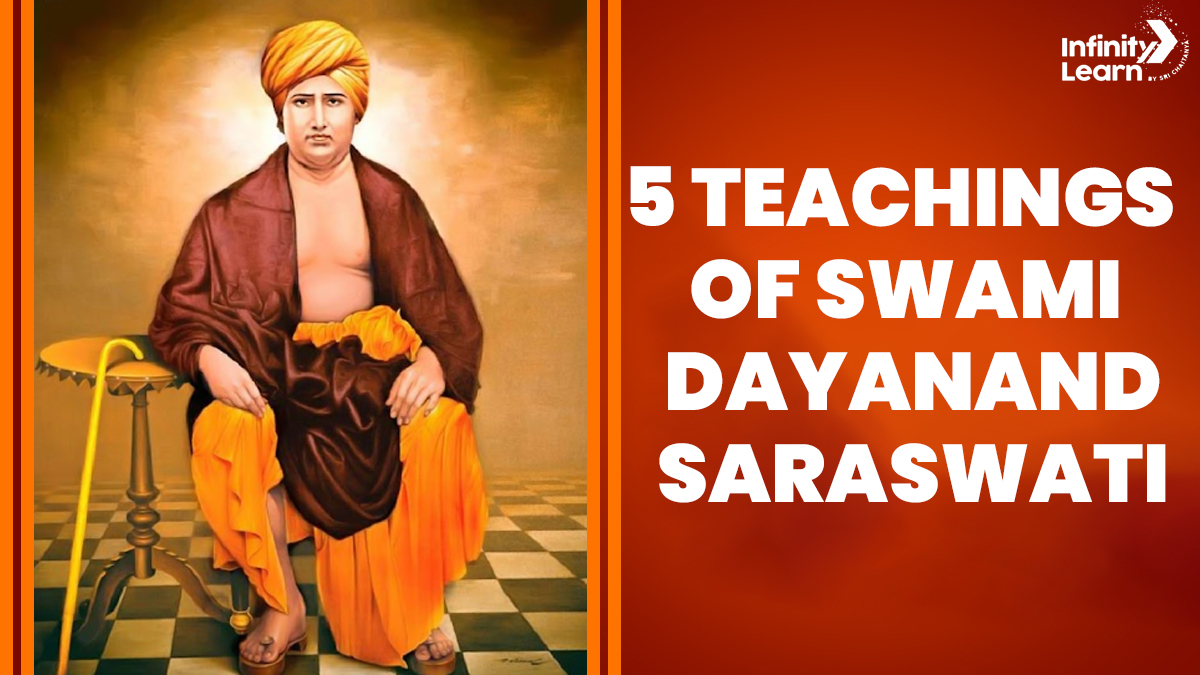Table of Contents
Swami Dayanand Saraswati
Swami Dayanand Saraswati, a renowned Indian philosopher and social reformer, initiated the Arya Samaj, a movement aimed at reforming Hinduism. He was born on February 12, 1824, in Tankara, Gujarat. Swami Dayanand Saraswati emphasized the significance of the Vedas and upheld Vedic principles throughout his life, leaving a profound impact on Indian society. One of his notable contributions comprises the 5 teachings of Swami Dayanand Saraswati. These teachings advocate the primacy of the Vedas as the ultimate source of knowledge, the necessity for social and religious reform, the importance of educational transformation, and the promotion of nationalism and liberation from British rule. His teachings continue to influence various social and religious movements in India, shaping the nation’s ethos.
5 Teachings of Swami Dayanand Saraswati
- Primacy of the Vedas
- Social and Religious Reform
- Educational Transformation
- Promotion of Nationalism
- Liberation from British Rule

Detail Explanation of 5 Teachings of Swami Dayanand Saraswati
Here are the five teaching of Swami Dayanand Saraswati in detail:
Primacy of the Vedas
Swami Dayanand Saraswati championed the Vedas as the foundation of all knowledge and the essence of Hinduism. He argued that the Vedas were infallible and contained universal truths applicable to all aspects of life. Unlike many of his contemporaries, Dayanand advocated for the direct reading and interpretation of the Vedas, challenging the authority of the priestly class that often interpreted these texts in ways that served their interests. An interesting, lesser-known fact is that Dayanand learned several languages, including Sanskrit, to study the Vedas in their original form, promoting a direct connection with these ancient texts without reliance on intermediaries.
Social and Religious Reform
Swami Dayanand’s call for social and religious reform was revolutionary. He vehemently opposed caste discrimination and the practice of untouchability, arguing that these practices had no basis in the Vedas. His stance on gender equality was equally radical for his time; he advocated for the education of women and their right to inherit property, which was almost unheard of in the 19th century India. A fascinating aspect of his commitment to social reform was his challenge to the practice of animal sacrifice in religious ceremonies, advocating for ahimsa (non-violence), a principle deeply rooted in Hindu philosophy but often ignored in practice.
Educational Transformation
Dayanand’s vision for educational reform was comprehensive. He established gurukuls to offer an education that combined traditional Vedic learning with modern subjects such as science and mathematics. This approach was innovative, aiming to create well-rounded individuals equipped to contribute to society. An intriguing fact about these gurukuls is that they were among the first in India to promote co-educational learning environments, challenging societal norms that kept educational opportunities for women severely limited.
Promotion of Nationalism
Swami Dayanand was a forerunner in promoting Indian nationalism at a time when the concept of a unified Indian nation-state was still in its infancy. He envisioned India as a sovereign nation free of British rule, grounded in the principles of the Vedas but embracing modernity. He is known to have inspired several key figures in the Indian independence movement, including Bhagat Singh, a fact that underscores his influence beyond religious and social reform to the very heart of India’s struggle for freedom.
Liberation from British Rule
Dayanand’s advocacy for India’s liberation from British rule was interwoven with his vision for the country’s spiritual and material revival. He believed that true independence would come from the rejection of all forms of foreign control and the re-establishment of a Vedic social order. A less commonly known aspect of his campaign against British rule was his critique of Western education and culture, which he viewed as detrimental to Indian values. However, he also recognized the importance of adopting Western methods in science and technology, advocating for a synthesis of the best practices from both the East and the West.
Contribution of Swami Dayanand Saraswati
- Swami Dayananda Saraswati made several significant contributions to Indian society. Some of his notable contributions include:
- Founded the Arya Samaj in 1875 to revive Vedic teachings and promote truth, righteousness, and selfless service.
- Emphasized the importance of education, particularly for women, and advocated for their right to education and reading of Indian sacred texts.
- Fought against social evils such as untouchability and caste discrimination, while championing religious tolerance and harmony.
- Advocated for self-rule (Swaraj), the use of Hindi as the national language, and the development of an all-India community spirit.
- Wrote influential works like “Satyarth Prakash” (The Light of Truth), “Sanskarvidhi,” “Rigved Bhashyam,” and “Rigvedadi Bhashyabhumika.”
- Left a lasting impact on Indian society, with his teachings continuing to guide and inspire millions as an integral part of India’s cultural and spiritual heritage.
FAQs on Teachings of Swami Dayanand Saraswati
What was the original name of Dayananda Saraswati?
The original name of Dayananda Saraswati was Mool Shankar Tiwari. He later adopted the name Dayananda Saraswati upon his initiation into sannyasa, or renunciation.
What were the ideas of Dayananda Saraswati on Swadeshi?
Dayananda Saraswati's ideas on Swadeshi emphasized self-reliance and the promotion of indigenous products. He believed in the importance of using and supporting local goods to strengthen the Indian economy and resist colonial dependence.
What was the educational thought of Dayananda Saraswati?
The educational thought of Dayananda Saraswati focused on Vedic education and moral development. He advocated for the establishment of gurukuls, where students could learn about the Vedas, Indian culture, and values, alongside modern subjects.
How did Swami Dayanand Saraswati die?
Swami Dayanand Saraswati died on October 30, 1883, due to poisoning. It is believed that he was poisoned by his own cook, who was influenced by individuals opposed to Dayananda's reformist ideas.
What are the main teachings of Dayanand Saraswati?
The main teachings of Dayanand Saraswati include the primacy of the Vedas, social and religious reform, educational transformation, promotion of nationalism, and liberation from British rule. He emphasized equality, rationality, and the importance of following the true teachings of the Vedas.








